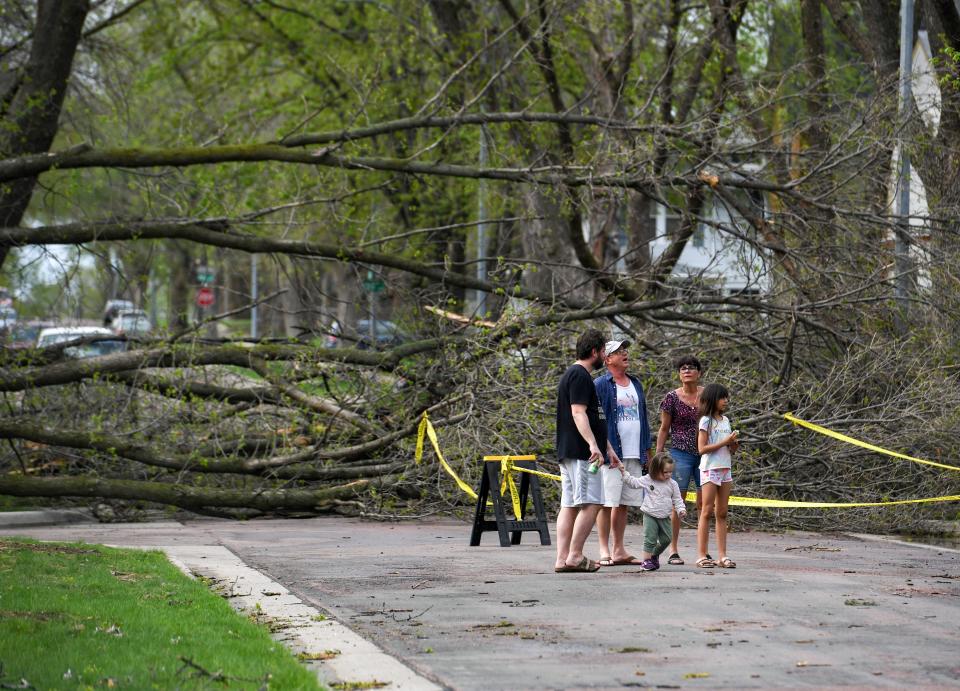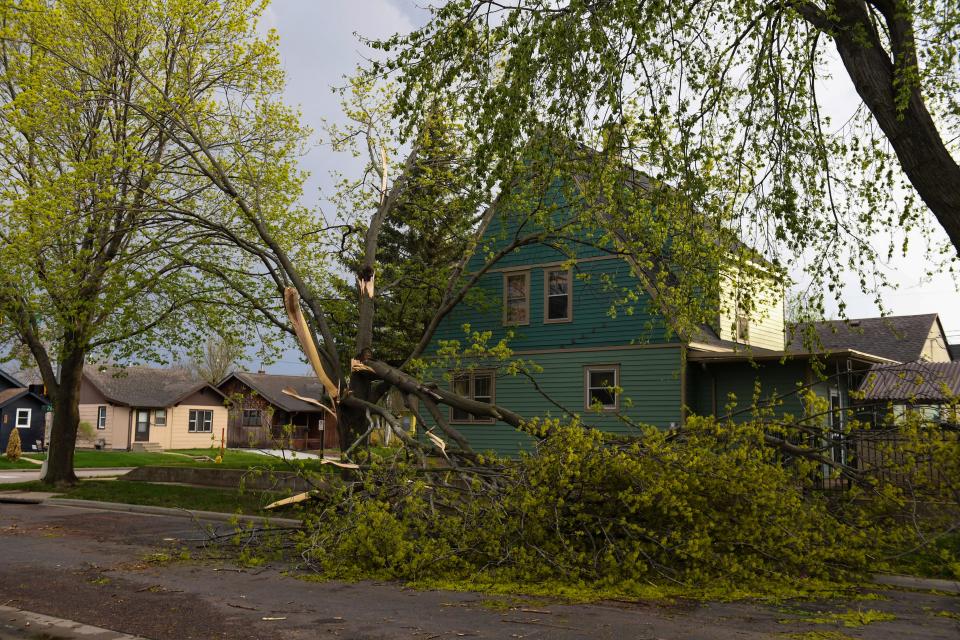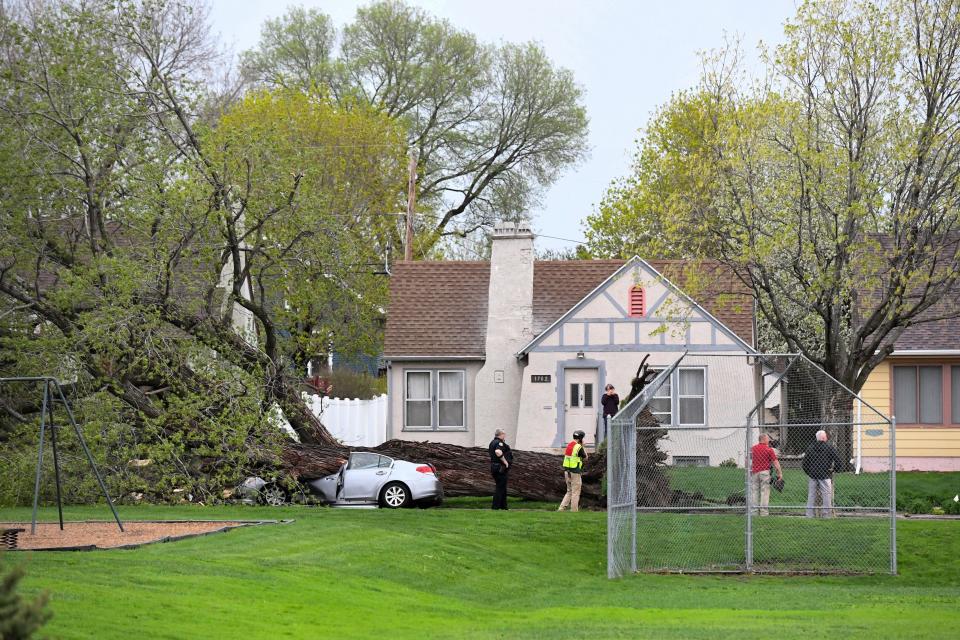Sioux Falls officials say sirens are only for tornadoes. Not everyone agrees.
Sioux Falls has no plans to start sounding the city's outdoor warning sirens for anything other than a tornado warning — something that wasn't issued last week as straight-line winds roared through Sioux Falls on Thursday, killing two people in Minnehaha County.
But many residents are questioning whether that's the right response to a storm like the one that hit Sioux Falls last week, which officials said caused damage "reminiscent of a high-end EF0 tornado or a low-end EF1 tornado."
At a press conference the day after the storm, the city's policy was defended by Emergency Manager Regan Smith and Mayor Paul TenHaken, as well as Todd Heitkamp, meteorologist-in-charge at National Weather Service Sioux Falls.
Previously: Why didn't Sioux Falls' storm sirens go off during the derecho Thursday?
"If we activate the system for many uses, many times, individuals are going to become complacent, they're going to be confused about that warning," Smith said, adding that he and Heitkamp had both sat on "a national policy committee on outdoor warning siren use and policies."
"We review these policies time and time again and have just come to the conclusion this is the easiest, most effective way to save lives," Smith said.

Communities in Iowa, Nebraska and South Dakota expand when sirens are used beyond tornado warnings
But other communities, both in South Dakota and surrounding states, have come to a different conclusion.
In Nebraska, sirens sound throughout Omaha and the rest of Douglas County when the NWS initiates a tornado warning for any portion of the county, when a public safety official or trained storm spotter can see a rotating funnel cloud or tornado within the county, or when Douglas County 911 "receives credible reports of damage or the imminent threat of hurricane-force sustained winds greater than 74 mph."
Des Moines is part of Polk County, Iowa, where emergency management's policy is to activate the sirens upon receiving a tornado warning or a severe thunderstorm warning "where forecasted or actual wind speeds reach or exceed 70 mph."
Polk County Emergency Management's current policy was adopted in 2010, and was announced in a letter from director A.J. Mumm.
"Historical research of weather records from the National Climatic Data Center dating back to 1987 indicate that on average, the sirens would be activated one additional time per year for severe thunderstorms with winds at or exceeding 70mph," Mumm wrote. "This research alleviated the concern that we would be desensitizing the public by overuse of the sirens."
A 2018 document giving justification for maintaining the policy stated that "Empirical observations indicate that there are far more false-positive tornado warnings (warning with no tornado or damage) than there have been for high-wind events."
Across the state in Pennington County, the policy is even more broad. Sirens are sounded for any life-threatening emergency, whether natural or human-caused, as determined by public safety officials.
According to the county's website, a siren you hear in Rapid City or Box Elder could mean anything from a tornado to a wildfire, flash flood, dam failure or even an act of terrorism.
"We don’t want to reserve it just for tornadoes," said Alexa White, the deputy director for Rapid City and Pennington County emergency management, "because there’s certainly other things that could affect our community.”
She cited the city's 1972 flood as a "hot-button issue" that factored into how to use the sirens, and said a situation like the May 12 storm in Sioux Falls likely would have resulted in them sounding, though she couldn't guarantee it.
"But every community is potentially different" in how they use the sirens, she said — noting that people who move to the area from states like Oklahoma or Kansas have been "a little bit confused" about how sirens are used.

And just south of Sioux Falls, sirens are activated in Clay County for tornado warnings as well as "imminent danger that require citizens to seek immediate shelter," with the ability for a weather spotter to activate them "if they feel the situation is dangerous to the general public."
The policies do all concur on one point that Heitkamp reiterated at the Friday press conference — regardless of what they're sounding for, outdoor warning sirens are only one aspect of keeping the public safe, and they have a singular purpose: to get people who are outside to seek shelter indoors and find more information about the emergency.
Asked for comment from Smith and TenHaken on the difference between Sioux Falls' policy and those of other surrounding communities, the city provided a statement from Smith restating his comments from the press conference, as well as stating that after evaluating the policy, "the City of Sioux Falls plans to continue the current policy on sounding outdoor warning sirens."
"Studies show that overuse of sirens leads people to ignore them," it read. "If we sound the sirens for many uses, at many times, individuals will become complacent and confused about the warning’s intent."
Sioux Falls is not alone in tornado siren policy

To be sure, Sioux Falls is far from the only community to have such a policy. A 2015 study that asked 366 members of the International Association of Emergency Managers about outdoor warning siren policy found that 51.8% of respondents used them exclusively to alert for tornadoes.
That includes the two largest cities in Missouri, Kansas City and St. Louis, which only sound outdoor warning sirens for tornado warnings.
But several community members are asking whether Sioux Falls is right to stay in that category.
"I'd like to encourage Sioux Falls City officials to re-evaluate the use of sirens for severe storms," wrote Steve Hildebrand, former owner of Josiah's and the founder of the Promising Futures Fund nonprofit, on Facebook.
"These are disaster sirens," former city councilor Theresa Stehly wrote on Saturday. "What harm would have happened had they been used Thursday?"
More: 'She was like an angel on earth:' Lincoln High mourns the death of teacher Annie Lanning
Former mayoral candidate Taneeza Islam wrote on Facebook Wednesday that she had recently attended a celebration of life for Annie Lanning, who died in the storms.
"When your government is people-centered, you are always working on how to protect and serve residents the best way possible," Islam wrote. "When leaders double down on it being a 'tornado siren and we didn't have a tornado,' those leaders have clearly lost sight that two people died."
"Only those leaders can change what the sirens’ purpose is," Islam continued. "Isn't saving one life worth reassessing the policy and aligning with other cities who use their sirens to warn its residents of catastrophic weather conditions, which we know can be more than a tornado?"
This article originally appeared on Sioux Falls Argus Leader: Sioux Falls sirens are only for tornadoes. Not all communities agree.

